Send your question to Umbra!
Q. I’m trying to use less plastic. Currently, I line the kitchen trash can with 13-gallon bags and the bathroom and bedroom cans with plastic grocery bags. But I don’t want to buy more 13-gallon bags, and, as I now exclusively use cloth bags for shopping, my plastic grocery bag supply is dwindling. What do you suggest for handling household trash without plastic? When I was a child, we lined the trash cans with newspaper, but I don’t have much of that around.
Kathy D.
Syracuse, N.Y.
A. Dearest Kathy,
I think your decision to use less plastic is, well, fantastic. As you’ve discovered, making the change to a less plasticky lifestyle involves adjusting some old habits – like the convenience of tossing trash into readily available bags – but it can be done. What’s more, I think you’ll find it quite freeing once you get the hang of it.
The surface problem here is that we need a new way to deal with household trash. But Kathy, let’s go a bit deeper with this: If you don’t have any household trash, then your problem disappears. See what we just did there? Now, I realize that completely eliminating garbage sounds like a tall order (though it can be done!). But focus on simply reducing your trash, and then you won’t need to worry so much about the bags you use to haul it around.
How to do it? One, recycle everything that can be recycled. Two, if you don’t already, get those food scraps out of the can and into the compost (go here, here, and here for some get-started tips). Three – and this is the biggie – stop garbage before it starts through strategic purchasing. There are plenty of ways to reduce, if not totally eliminate, packaging and other wastes when we start to look for them.
The web abounds with resources on slashing your trash. The first place I’ll point you is the excellent Zero Waste Home blog, Bea Johnson’s chronicles of cutting her family’s waste to practically nothing. She’s full of tips targeting common trash troubles in the kitchen, bathroom, and beyond, some of which we’ll dig into in a minute. And let’s not forget, this principle applies to recyclable items too: A reusable bottle is better than a recyclable one, and no bottle at all trumps them both.
Some guidelines for adopting the less-waste lifestyle: Seek out items with minimal and/or recyclable packaging. Naturally, going for whole foods and shopping at farmers’ markets makes this even easier. Buy in bulk whenever possible, preferably using your own glass jars for food and those nifty refilling stations for soap and shampoo. Make your own cleaning products and use rags instead of disposable scrubbing products (and do I even need to mention my love for cloth napkins?). Opt for rechargeable batteries and reuse gift bags. Donate worn-out clothes and shoes to charity; even the most beat-up items can be sold for textile recycling. You get the idea, I’m sure.
Now that we’ve whittled your waste problem down, Kathy, there still remains the matter of what to put in your garbage bin. Because we’re diverting food from the pile, the contents should be dry and inoffensive – so do you even need a liner? Some waste management companies do require you to bag your bilge, so check with your local hauler to find out. Even if you do find you need to bag it, I recommend lining only your largest garbage can and emptying all other household bins into it for a trip to the curb.
Another option could be reusing packaging bags, such as those you get with chips, bread, or dog food, to corral your waste. (Even those of us shopping with an eye toward whole foods and sustainable disposal occasionally succumb to the urge to buy tortilla chips.) Failing that, I’d go with recycled plastic garbage bags. Yes, they’re still plastic, and yes, you have to buy them. But providing a market for recycled products is a big part of recycling overall; and if you’re implementing some zero-waste practices, then one box should last you a loooong time. (On a related note, I wouldn’t go for biodegradable bags – they won’t degrade at all in your typical landfill.)
See how your desire to reduce plastic can domino into a quest to significantly trim your waste load as a whole? Thinking green tends to do that, with, yes, fantastic results.
Sparingly,
Umbra




